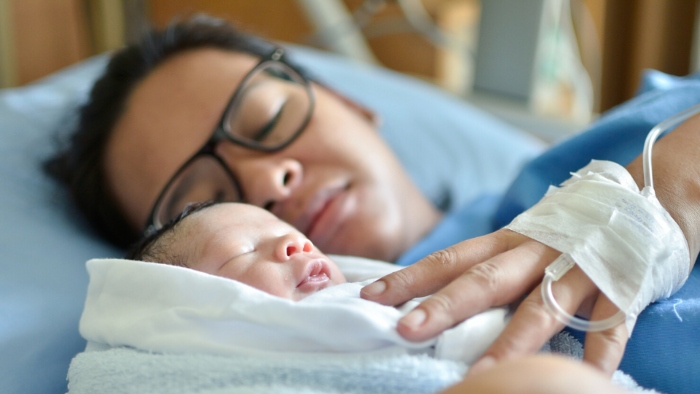Pregnancy always comes with questions and concerns, but as the world struggles against the novel coronavirus COVID-19, those concerns may seem overwhelming.
The sheer amount of information coming out can also be overwhelming and confusing to navigate. At Walnut Hill, we know that many mothers-to-be are worried and frightened about how this virus may affect them and their babies.
We have developed a simple breakdown of information to help you through these confusing and stressful times. As always, please reach out to us here if you have any questions about COVID-19 and how it relates to your pregnancy.
How Does COVID-19 Affect Pregnancy?
The unfortunate fact is that no one knows if pregnant women have a greater chance of getting ill with COVID-19 than the general public.
According to the Centers for Disease Control, women who are pregnant experience changes in their bodies that could increase their risk. Viruses that are in the same type of category as COVID-19 and other viral respiratory infections like the flu do present a higher risk of developing into a more severe illness for women who are pregnant.
The CDC recommends that pregnant women always protect themselves from illnesses. Pregnant women are urged to take the same steps as the general public to avoid being exposed to viruses and other illnesses.
The World Health Organization (WHO) says research is currently underway to understand the impacts of COVID 19 infection on pregnant women. Although data is limited, at present, there is no evidence that they are at higher risk of severe illness from COVID-19 than the general population.
You can help stop the spread of COVID-19 by taking these actions:
- Practice respiratory hygiene. This means covering your mouth and nose with your bent elbow or tissue when you cough or sneeze. Then dispose of the used tissue immediately.
- Avoid people who are sick
- Avoid touching your face
- Wear a mask when in public or around other people. Though a mask will not prevent you from contracting the virus, it does protect others from your droplets.
- Clean your hands often using soap and water or alcohol-based hand sanitizer. Wash hands thoroughly for at least 20 seconds after blowing your nose, sneezing, using the bathroom, coughing and before preparing food or eating.
You can find additional information on preventing COVID-19 disease at CDC’s (Prevention for 2019 Novel Coronavirus). If you are experiencing flu-like symptoms, call your primary care physician as a first step. If you have recently traveled to a country with ongoing person-to-person transmission of COVID-19, please let your doctor or medical professional know before coming to your doctor’s office.
What Problems Can COVID-19 Cause During Pregnancy?
Again, not much is known at this time. Because the virus is so new, no recommendations have been made that are specific to women or women who are pregnant.
Pregnant women, however, are more susceptible to viral respiratory infections due to changes that occur in the bodies when pregnant. For instance, if you are pregnant and catch a respiratory virus, you are more likely than a non-pregnant woman to develop more severe complications, like pneumonia.
Whether or not a pregnant woman can pass the COVID-19 virus on to her unborn baby is also unknown. However, initial studies are hopeful. Small studies of babies born to mothers who tested positive for COVID-19 show that the babies have tested negative for the virus.

Can COVID-19 Be Passes On Through Breast Milk?
According to the CDC, limited studies have found no evidence of the virus in breast milk in women with COVID-19. Be aware that because so little data exists, the CDC says it is unknown at this time if mothers with COVID-19 can transmit the virus via breast milk.
Breast milk is the best source of nutrition for most infants, according to the CDC. Whether to start or continue breastfeeding should be determined by the mother in coordination with her family and healthcare providers.
The WHO confirms that women with COVID-19 SHOULD breastfeed if they wish to do so, but should practice the following:
- Practice respiratory hygiene during feeding and wearing a mask when available.
- Wash hands before and after touching the baby.
- Routinely clean and disinfect surfaces that are commonly touched.
- If expressing breast milk with a manual or electric breast pump, the mother should wash her hands before touching any pump or bottle parts and follow recommendations for proper pump cleaning after each use. If the mother is symptomatic, consider having someone who is not sick feed the expressed breast milk to the infant.
Should New Mothers Touch Their Babies If Exposed?
The World Health Organization encourages new mothers who have COVID-19 to hold, touch and breastfeed their babies to help them thrive. Again, mothers should wear a mask and practice respiratory hygiene when holding their infant and wash their hands and all surfaces before and after handling a baby.
Talk to your OBGYN at Walnut Hill
As always, if you have any questions or concerns, please feel free to contact us. Due to the current situation, we are scheduling routine appointments online. We have an extremely easy to use telemedicine option for patient interaction, in lieu of in-person appointments. All data is HIPAA compliant, confidential and encrypted.
Please either call the front office at 214-363-7801 or contact us through the portal as usual to request a telemedicine appointment and you will receive a time and sign-on instructions. Signing on will literally take you less than a minute and will require only your full name. We are here to help you and answer all of your questions.

